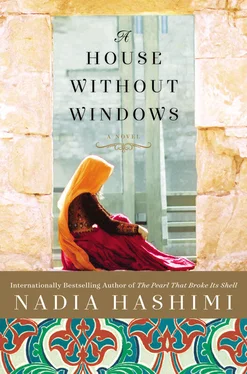In the end, he’d promised to take the mullah’s entreaties into consideration and do anything he could to honor his friend’s request. He swore not to breathe a word of their relationship to anyone else and he’d meant it. If this case did attract attention, Najeeb did not want too much scrutiny to land on the shrine. The mullah was truly helping people there, and the judge didn’t see any reason to drag a man of God’s good works through the mud.
Najeeb stepped into the street, pulling his tasbeh from his vest pocket. He lived on a lane of similar one-storied homes, each bordered by an outer wall that lent privacy to their inner lives. It made the road into something of a corridor, high walls on either side. Najeeb closed the metal door behind him, shuttering his sanctuary from the view of neighbors and passersby. He thought of the swarms of people who’d entered Zeba’s home that day and surrounded her, as the police report had described. How many had there been? Dozens of gawkers trespassing a family’s private life. That was what these women did not understand, Najeeb thought. All the women of Chil Mahtab had taken down their walls with their crimes, they’d pulled aside their purdah, their protective veil. Some had flaunted their relationships with men. Some had worked late hours with male colleagues. Some had left their fathers’ homes. They should have anticipated the consequences.
Najeeb had not made it to the end of his block when he stopped abruptly. He narrowed his eyes and wondered if his vision was not in worse shape than his knees. There was no mistaking her, though.
“What are you doing here?” he asked incredulously.
“Qazi- sahib, ” Gulnaz said, her voice even and purposeful. “I need to speak to you.”
“How did you find me?”
“I asked people. You’re well known in this neighborhood.”
He’d stopped thumbing the beads of his tasbeh .
“What do you want?” he asked, wondering if he should turn her away without waiting for an answer. He’d already begun to suspect that he’d been too lenient on Zeba in the first few weeks of the case. He felt manipulated now, knowing that Gulnaz was the type of woman to drive a decent husband away. It gave him all the more reason to believe Zeba had begun to follow in her mother’s footsteps but then veered down an even deadlier path.
“I need to speak to you.”
“Quickly. I have things to do and you’re interrupting my evening.” He folded his arms across his chest, the beads draped over his elbow. Gulnaz took a deep breath and began the speech she’d rehearsed on her way to the judge’s home.
“Qazi- sahib, you and I are from the same village. We met as children. We lived in the shadow of the same masjid and waded through the same streams. You’ve known my family and have been welcomed into our home. I am coming to you now to ask for mercy. My daughter suffered with that man, and it is no secret what kind of man he was.”
“Because we are from the same village does not mean I should ignore a crime. It’s my duty as a judge to mete out justice.”
“We all want justice.”
“Then you’ll understand that I must do the right thing here. I know she’s your daughter, but I’m responsible for making sure the law is respected. We cannot afford to let our nation fall into anarchy again and this is where it starts.”
“What about his crimes? His crimes went unpunished. He was a drinker, a man without a decent friend. He did not pray or fast or follow the words of God. A black carpet is not made white by washing. My daughter did her best to live with this man and be a good wife to him, but she could not absolve him of his sins.”
“She didn’t need to absolve him. She could have left judgment up to the law or to Allah.”
“I’m asking you to consider her children. Her son is devastated, her three daughters have no one now. They’ve lost both their parents. Do we really need more orphans in this world? Let them have their mother back, please!”
“Criminals cannot hide behind their children.” It was not that he was a callous man. Of course he’d taken into consideration that Zeba had left four children behind when she’d been arrested. He also knew the youngest was barely a year old. He’d memorized these details the first day he reviewed her case and could almost picture her little ones, their anonymous faces sometimes replaced by those of his grandchildren. He kept these things to himself.
“I do not have money to offer you, Qazi Najeeb. The days when my family lived comfortably are long gone. I’ve been alone for most of my adult life, and my son struggles to feed and clothe his family.”
Najeeb grew angry at her implication.
“I’ve not asked you for a penny! Khanum, I have always been grateful to your father, the murshid . He gave my own father much hope when we had nearly none. My brother survived his illness and is alive and well even now. Do you really think I would ask for money after all that?”
Gulnaz said nothing. The sun had dipped behind wispy clouds, the sky a canvas streaked with paprika and saffron. The spiny profile of the mountains cut into the sunset. She wasn’t really asking for mercy. She was asking for justice.
“There’s something else you need to know.”
Gulnaz scanned the street and saw children playing with a bicycle tire nearby. There was no one within earshot.
“It was someone else who actually killed him.”
The judge nodded as if he’d expected Gulnaz to come up with something more unbelievable in retort.
“Like who? I’d be very interested to know who else might have been there. No one’s said anything about someone else being there that day, including your daughter!”
“If you hang my daughter, you’ll be making her a martyr.”
“A martyr?” he scoffed. “A martyr for what?”
“She is at the court’s mercy because she tried to save a life that day. What I’m about to tell you is the absolute truth though I cannot provide any evidence for it, and my daughter does not wish for anyone to find out about this. She’s not breathed a word of it to you since her arrest because she fears for the safety of a young girl.”
Najeeb felt the ache in his chest start up again. He would eat a spoonful of yogurt before going to bed and see if that settled the acid.
“Explain.”
Gulnaz bit her lower lip. She had not bothered to tell Zeba she would be speaking to the judge and had certainly not discussed with her daughter what she would be telling him. But what would happen if Zeba were to find out about this conversation? She would either go right back to resenting her mother, which Gulnaz had become accustomed to, or she would be grateful. It was a chance she was willing to take.
“The day came when Zeba learned what kind of man he truly was. She found him attacking a young girl in their own home, defiling a school-age girl. That, dear judge, is the heart of the matter. All that came after, including her enduring nineteen days of the shrine, was a woman trying to protect the honor of an innocent child.”
Najeeb huffed in exasperation. At every turn, there was some new disparaging revelation about the dead man. Convenient, he thought, that the man was in no position to defend himself. His family didn’t do much to defend him either, probably because of the nasty rumors floating around about him and the desecration of the Qur’an.
“A child,” Gulnaz repeated slowly for emphasis. “You’re a father and a decent man. Imagine how Zeba felt to see such an atrocity in her own home.”
“Yes, Khanum, I am a father,” Najeeb said defiantly. She’d come here because she thought she could sway his thinking. She thought she could tease his decision in Zeba’s favor, but it wasn’t as simple as she’d anticipated. Qazi Najeeb felt a bit smug. He knew her better than she thought. “I have three sons and two daughters, all grown and raising families of their own. If there’s one thing I know as a father, it’s that a mother would do anything for her children.”
Читать дальше











